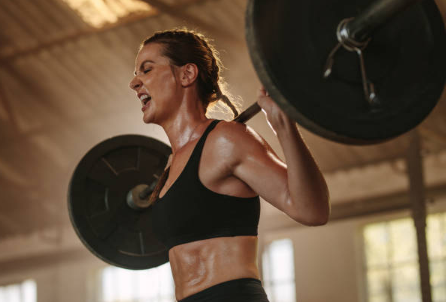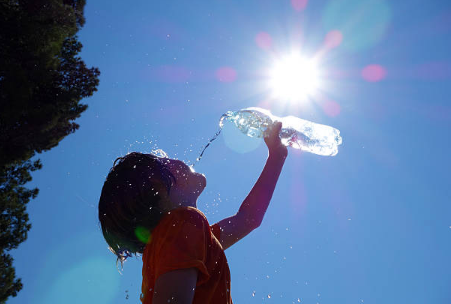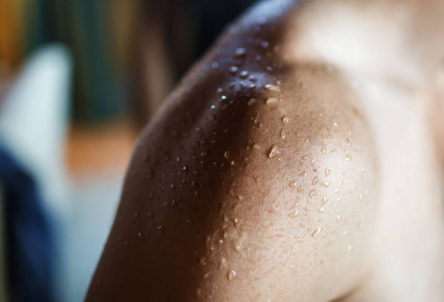Sweating is the body’s way of maintaining its internal temperature. You may sweat profusely while exercising because muscle contractions generate heat. Your body stimulates the sweat glands to release sweat and cool down.
Some people sweat more than others, especially during and after a workout. Read on to find out why you sweat so much in the gym and how to control it.

Why Do You Sweat
Sweating or sweating can help your body cool down and regulate its internal temperature. Your body secretes sweat from sweat glands, which is a liquid that contains salt. You may sweat more than usual when your body is too hot, which usually happens during and after exercise, or when standing in hot weather. Some people sweat when they are angry, embarrassed, or nervous.
Other causes of sweating include:
- Alcohol
- Alcohol and drug withdrawal
- Caffeine
- Cancer
- Certain medications (e.g., morphine, thyroid hormones)
- Fever and infection
- Hypoglycemia
- Menopause
- Spicy food
Types of Sweating
Some people may experience various types of sweating, while others may only notice one or two. The different types of sweat include:
- Body sweating: This sweat is secreted by small sweat glands and can run down from you during workouts or when standing in the hot sun. Body sweating cools your skin and keeps the internal body temperature as stable and normal as possible.
- Body odor sweat: Your body excretes this sweat from the top sweat glands in the armpits, breasts, face, genitals, and scalp area. This type of sweat produces body odor due to the bacteria that live in these places.
- Hand and foot sweat: This is the sweat of the palms and soles of the feet. Sweat from hands and food helps increase adhesion and grip. This sweating is also your body’s response to a perceived threat. You may notice that your hands and feet sweat when you’re anxious.
Sweating During Exercise
It’s normal to sweat more than usual during and after a workout. Contracting muscles during exercise generates heat. As a result, your internal temperature rises.
Your autonomic nervous system activates sweat glands that secrete sweat and keep you cool.
If you work out harder than before, your body is more likely to sweat while exercising. That’s why a well-trained athlete can run a mile for 10 minutes without breaking a sweat, while the same workout can leave a less physically fit person soaking wet. The more you train your body, the better your body’s ability to regulate its internal temperature.
Helping you acclimatize
Sweating is part of acclimatization, or a beneficial way for the body to adapt to repeated exposure to heat and exercise. Acclimatization helps regulate your internal temperature and heart rate, increases sweating efficiency and increases blood flow.
Keeps you cool
Although you may be left with a large wet spot on your shirt, sweating during and after exercise is ultimately a good thing. Sweating means your body is better able to respond to the demands of exercise and stay cool.
If your internal temperature rises too high and your body can’t cool itself down, you may develop a fever. Fever may cause muscle pain during exercise or rashes due to excessive sweating. The most severe type is heat stroke, which is a medical emergency that causes a rapid pulse, dizziness, and nausea.

Release impurities
Sweating helps to release dirt and sebum (oil) that has accumulated on the skin. Remember to wipe off sweat when exercising and wash your face after exercising. If these impurities remain on the skin, they can clog pores and cause acne breakouts.
Why Some People Sweat More
Hyperhidrosis causes excessive sweating throughout the body that lasts longer than the body needs to cool down. Some people are more likely to develop hyperhidrosis and sweat more than others.
Risk factors for hyperhidrosis include:
- Alcohol use disorder
- Certain health conditions (such as diabetes, Parkinson’s disease and thyroid disease)
- Genetics
- Infection
- Medications (such as anxiolytics and insulin)
- Tumor
Techniques to Control Sweating
Sweating may be healthy and normal. Still, if you’re sweating excessively for comfort, there are a few things you can do to fix the problem.
Here are some ways to control your sweating:
- Get your body acclimated: Take a few days to safely acclimatize to the heat.
- Think about your clothes: Wear lightweight, loose-fitting clothing made of sweat-wicking polyester
- Control foot sweat: Friction can cause your feet to sweat, so make sure you change your shoes and socks frequently.
- Stay hydrated: Drink plenty of water, especially if you sweat profusely.
- Use antiperspirants: Apply antiperspirants to your hairline or other parts of your body to suppress localized sweating. Keep in mind that if you block the sweat glands in one part of your body, other parts of your body may sweat more than usual.
- Exercise indoors when it’s hot: Exercise outdoors only in cool temperatures.
The Importance of Staying Hydrated
If you’re sweating a lot, make sure you have a water bottle handy. The more you sweat, the more you need to hydrate to replace lost water. Try weighing yourself before and after your workout to see how much water you need.
If you don’t drink enough water regularly, workouts that allow your body to adapt or slowly expose to less sweating won’t work. Hydrate before, during, and after exercise to train your body to withstand heat and cool your internal organs.
Sweat contains essential electrolytes like sodium, which are necessary for your body to function properly. Most people consume enough sodium in their diet, so there is nothing to worry about. Conversely, if you sweat profusely, you may need an electrolyte-rich sports drink to replace the lost electrolytes.
Most adults can comfortably and safely drink a few glasses of water in an hour while exercising. Keep in mind that experts recommend not drinking more than 48 ounces at a time. Eating too much can dilute your blood salt concentration enough to cause complications.

Hyperhidrosis Treatment
Some people who sweat excessively may need additional treatment to stay dry. Treatment for hyperhidrosis includes:
- Antiperspirants: Helps clog overactive sweat glands. Try an antiperspirant that contains 10% to 20% aluminum chloride hexahydrate. Some people need prescription-strength solutions. Antiperspirants work best if you use them before bed, but they may irritate your eyes and skin.
- Botox injections: Treat sweating in the armpits, hands, and feet by blocking the nerves that activate sweating. You may notice pain at the injection site, flu-like symptoms, and weakness.
- Iontophoresis: This process uses an electric current to shut down the sweat glands to reduce sweating of hands and food. Side effects are rare but may include blisters and cracks in the skin.
- Medications: These help to reduce sweat gland activity.
- Surgery: This involves cutting the nerves that stimulate sweating or removing sweat glands. Healthcare providers often reserve surgery when other treatments fail.
When to Contact a Healthcare Provider
Sweating during and after a workout is normal. Instead, you can contact a healthcare provider if you:
- Chest pain or pressure
- Unexpectedly lose weight
- Excessive sweating for a long time without any reason
- Sweating while sleeping
Other signs and symptoms that require medical attention include fever, rapid pulse and shortness of breath. These symptoms may indicate hyperthyroidism (hyperthyroidism).
Conclusion
There are several factors that can contribute to the feeling of excessive sweating during and after a workout. How much you sweat comes down to body composition, genetics, and how comfortable you are with exercising.
You can control the amount of sweat you sweat by gradually acclimatizing to the hot environment, getting used to activities, using antiperspirants, and wearing appropriate clothing. If you continue to sweat excessively, you may consider consulting a healthcare provider.